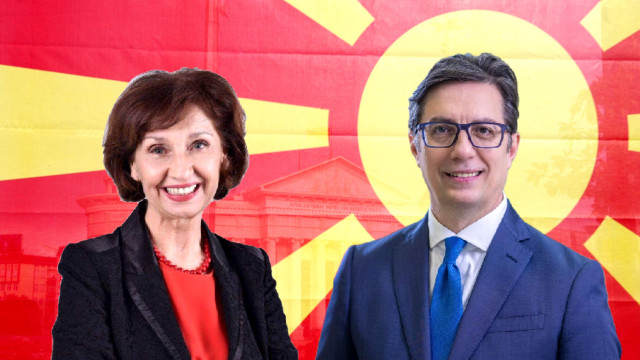Presidential elections in North Macedonia pit outgoing head of state Stevo Pendarovski of SDSM and Gordana Siljanovska-Davkova of VMRO-DPMNE against each other, BGNES reports.
The latest opinion poll, conducted by the Centre for Political Research and Communication in North Macedonia, gives Siljanovska a 20.4% support lead against 16.8% for Pendarovski.
The current president was born on 3 April 1963 in Skopje. He is a long-time politician from the Social Democratic Union of Macedonia /SDSM/.
He graduated in 1987 from the Faculty of Law and the Faculty of Political Science at the University of St. Cyril and Methodius in Sofia, and obtained his master's and doctoral degrees at the Institute for Sociological and Political-Legal Studies. In 2001 he joined the Cabinet of President Boris Trajkovski (VMRO-DPMNE) as an advisor.
In the election campaign, Pendarovski repeatedly used anti-Bulgarian rhetoric, although he pointed to the need to open the Constitution and to include Bulgarians in the Preamble.
"In this way a small Bulgarian minority will be inscribed" in the basic law, he said. The president has claimed over the past month that the Macedonian minority in Bulgaria has been "mistreated". In his words, Sofia wanted "Macedonians to enter the EU as Bulgarians".
At election events and meetings with citizens, the head of state pointed out that North Macedonia faced two blockades on the road to the EU - "the external one from Bulgaria and the internal one from VMRO-DPMNE". The President advocated for North Macedonia to remain in the Serbian project-initiative "Open Balkans".
The politician ran for president for the first time in the 2014 elections, when he lost against his VMRO-DPMNE opponent Gheorghe Ivanov. In 2019, he entered the presidential race again and defeated Gordana Siljanovska-Davkova in a run-off. In the second round, Pendarovski garnered 436,212 votes, or 51.66%.
He taught at the American College of Skopje, where he taught courses in International Security, International Relations, Introduction to Politics, Globalization, Geopolitics, US Foreign Policy, EU Foreign and Security Policy, and Small States in World Politics.
From 1998-2001 he was Head of the Analysis and Research Directorate at the Home Office and spokesman for the Department.
From 2001 to 2004 he was National Security Adviser to the President of the Republic of Macedonia. From 2004 to 2005, he was Chairman of the State Election Commission. From 2005 to 2009 he was Foreign Policy Adviser to the President of the Republic of Macedonia. From 2016 to 2017 he was a member of the Parliament of the Republic of Macedonia. Since November 2017 he has been the President of the Republic of Macedonia. Pendarovski has been appointed as the National Coordinator for NATO.
Gordana Siljanovska-Davkova has over the years been a staunch opponent of the Prespa Agreement between Macedonia and Greece, which resolved the name dispute of the Republic of Macedonia, and Athens supported Skopje for NATO and the EU.
Siljanovska is also firmly against the 2017 Friendship Treaty with Bulgaria. She opposed the law to expand the use of the Albanian language in 2018. During this year's election campaign, she firmly followed the anti-Bulgarian political line.
Siljanovska said at an election event that "the Preamble of the Constitution is not a phone book to include all our neighbours in it". On another occasion, she included the Bible and the Koran in the anti-Bulgarian campaign, calling for a change in the Negotiating Framework with the EU.
VMRO-DPMNE leader Christian Mickoski repeated several times that the constitutional changes are a "Bulgarian dictate" - a thesis that Siljanovska fully supports.
Siljanovska was born on 11 May 1953 in Ohrid, then Yugoslavia. In 1973 she completed her secondary education in the capital Skopje. In 1978 she graduated from the Faculty of Law of the University of Skopje and in 1993 she defended her doctorate in law in Ljubljana. The career of the head of state candidate in Macedonian institutions is rich. From 1990 to 1992 she was a member of the Constitutional Commission in the Macedonian Parliament. Siljanovska was a member of the Venice Commission from 2008 to 2016. From 1992 to 1994, she was a minister without portfolio in the first cabinet of Branko Crvenkovski, a member of the Presidency of the Union of Communists in Macedonia since 1990, known for his anti-Bulgarian views.
The first round of presidential elections in North Macedonia will be held on Wednesday, 24 April. The parliamentary elections will be held on 8 May, together with the second round of the presidential elections. /BGNES







